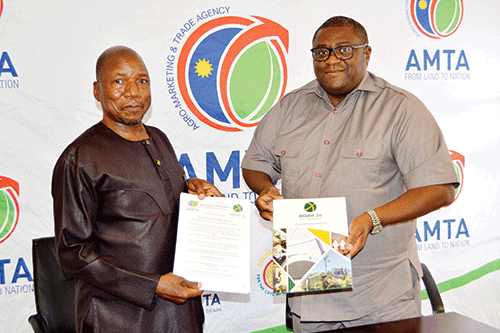The Agro-Marketing and Trade Agency (AMTA) and August 26 Holdings recently signed a memorandum of understanding (MoU) which will see both State-owned entities collaborating in areas of food production and logistics.
The MoU, signed in the capital by AMTA’s interim managing director Percy Misika and August 26 Holdings’ CEO Ndajoina Shalumbu, will also create additional opportunities for both companies to expand their scopes of operations, and tap into new areas of production.
Top of the agenda was the sharing of expertise and skills transfer between the two entities, and also the sharing of resources in order to ensure that they both deliver on their respective mandates through this partnership.
Another area of collaboration will be the supply of food items, clothing, transport and logistical services, which will bring ease to AMTA’s efforts of ensuring food security and visibility in the country’s leading production zones.
Not only that, but the partnership will place special emphasis on the critical aspect of processing and value-added food products, which remain scarce in the local food market, and related value chains.
Both Misika and Shalumbu expressed their excitement in bringing collaborative efforts and creating systematic synergies which will ensure the attainment of the country’s national developmental goals and Vision 2030, with particular emphasis on food self-sufficiency.
AMTA, which resorts under the ministry of agriculture, is tasked with coordinating and managing the marketing and trading of agricultural produce in the country. It is also entrusted with the mandate to manage the Fresh Produce Business Hubs (FPBHs) and National Strategic Food Reserve (NSFR) infrastructure, which are geared towards the attainment of food safety and security.
Through the FPBHs, AMTA is expected to stimulate domestic economic activities, employment-creation, technology and skills transfer, quality assurance, affordable access to nutrition, increase domestic market share of Namibian horticultural produce, and increase foreign currency earnings from horticultural exports.
The NSFR services are carried out through grain storage facilities, and are an important initiative of the government, which aims to maintain a national optimal level of food reserves to address local food shortages and respond to immediate emergency food requirements.
Food security remains a national priority, as all SADC member states are required to allocate 10% of their budgets towards food security goals.
In performing its role, AMTA works closely with AgriBusDev and the Namibian Agronomic Board (NAB). Namibia’s agriculture sector is constrained by a variety of challenges, such as limited human and institutional capacity, poor access to agricultural data by policymakers and farmers, low crop productivity, constraints in sustainable water resources management, inadequate capacity in processing, marketing and applying quality safety standards for crop and horticulture products, as well as a lack of coordination on food and nutrition security issues.
– ohembapu@nepc.com.na



